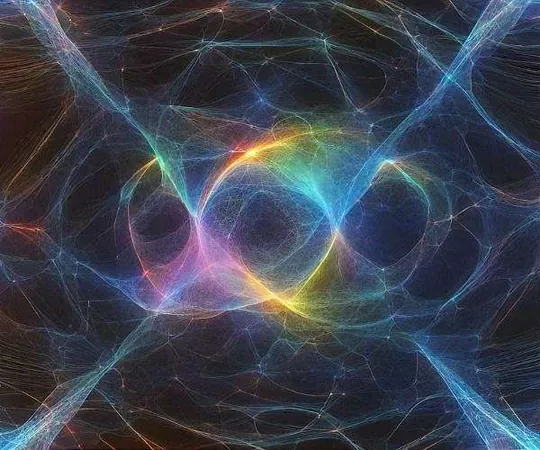
Is Dark Energy Just a Myth? New Evidence Reveals a 'Lumpy' Universe!
2024-12-22
Author: Mei
New Findings Challenge Dark Energy's Existence
In a stunning revelation that could shake the very foundations of modern cosmology, researchers from the University of Canterbury in New Zealand have unveiled findings suggesting that dark energy—a long-held theory to explain the accelerating expansion of the Universe—may not exist at all. Instead, their study proposes that the cosmos is much more chaotic and uneven than previously imagined, indicating that the forces governing its expansion are fundamentally different from the mysterious anti-gravity phenomenon we once thought.
The Timescape Model
For over a century, astrophysicists believed that the Universe expanded uniformly, employing dark energy to fill the gaps in our comprehension of cosmic dynamics. The innovative study puts forth the 'timescape' model of cosmic expansion, which attributes the variations in cosmic expansion to gravitational effects rather than relying on dark energy. This groundbreaking perspective suggests that the Universe is not growing steadily; rather, its expansion is influenced by gravitational time dilation, meaning time flows differently in varying gravitational contexts. Clocks in lower-density regions of space run faster than those in densely packed areas, creating a false impression of acceleration in cosmic voids.
Implications from Professor David Wiltshire
Professor David Wiltshire, who spearheaded the research, emphasizes the implications of these findings: "Our latest results suggest that the notion of dark energy has been a misinterpretation of the complex dynamics of our Universe. Instead of a uniform expansion driven by a mysterious force, we are witnessing a nuanced interplay of kinetic energy across a Universe that is, in reality, quite lumpy."
Challenging the Lambda Cold Dark Matter Model
These findings, published in the *Monthly Notices of the Royal Astronomical Society Letters*, directly challenge the widely accepted Lambda Cold Dark Matter (CDM) model, which heavily relies on dark energy to fit observations from supernovae and other astronomical phenomena. The researchers noted that recent data has increasingly called into question the CDM model. A significant unresolved issue known as "Hubble tension" highlights discrepancies between the inferred expansion rate of the early Universe and its current rate.
Further Evidence Against Dark Energy
Moreover, the Dark Energy Spectroscopic Instrument (DESI) has yielded results suggesting dark energy could evolve over time, in stark contradiction to the CDM model's assumption of constancy.
The Current Structure of the Universe
As Professor Wiltshire elaborated, "The current structure of the Universe is an intricate tapestry of galaxy clusters, sheets, and filaments surrounding vast voids. There is no necessity for a simple expansion law aligned with Einstein's general relativity when the Universe itself doesn’t conform to Friedmann's equations."
Future Research Directions
To further test the timescape model, researchers are gearing up for high-precision observations, with the European Space Agency's Euclid satellite and NASA's upcoming Nancy Grace Roman Space Telescope poised to play pivotal roles. For instance, Euclid will require over 1,000 detailed observations of independent supernovae to validate the timescape premise against the CDM model.
Building on Previous Research
This research builds on earlier findings from 2017, where preliminary analyses suggested that the timescape model might perform better than the CDM framework. Collaborating with the Pantheon+ research team, the Canterbury group analyzed data from 1,535 supernovae and now asserts they have uncovered "very strong evidence" for the timescape theory, potentially offering a resolution for perplexing phenomena like Hubble tension.
Looking Ahead to New Discoveries
With new data anticipated and technology advancing, there is hope that the profound mysteries surrounding the Universe could be unraveled by the end of this decade. As Professor Wiltshire concludes, "We stand on the brink of possibly redefining our understanding of the cosmos."
Conclusion
Stay tuned as the astronomical community awaits further revelations that could rewrite the narrative of our Universe!




 Brasil (PT)
Brasil (PT)
 Canada (EN)
Canada (EN)
 Chile (ES)
Chile (ES)
 España (ES)
España (ES)
 France (FR)
France (FR)
 Hong Kong (EN)
Hong Kong (EN)
 Italia (IT)
Italia (IT)
 日本 (JA)
日本 (JA)
 Magyarország (HU)
Magyarország (HU)
 Norge (NO)
Norge (NO)
 Polska (PL)
Polska (PL)
 Schweiz (DE)
Schweiz (DE)
 Singapore (EN)
Singapore (EN)
 Sverige (SV)
Sverige (SV)
 Suomi (FI)
Suomi (FI)
 Türkiye (TR)
Türkiye (TR)